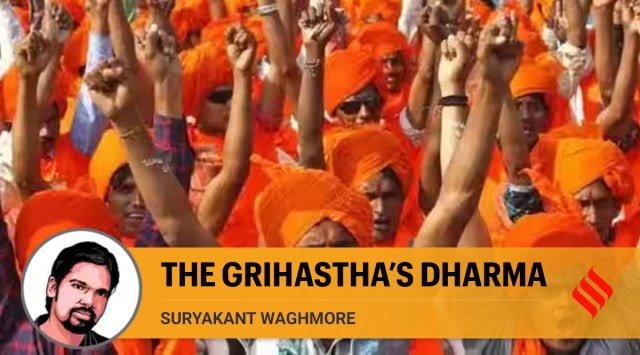
Ayam nijah paro veti gananā laghucetasām / udāracaritānānn tu vasudhaiva kutumbakam (The narrow minded ones like to ask, “Is this person one of us, or is he a stranger?”/ But to those of noble character the whole world is one family).
“Vasudhaiva kutumbakam” has become a powerful slogan and signifier of Indian cosmopolitanism in contemporary times. As mentioned in the epigraph above, “vasudhaiva kutumbakam” is from one of the tales of the Hitopadesa and is used by a cunning jackal to gain the trust and friendship of a deer that it plans to devour. While the deer and its friend, a crow, fall for those words, they manage to escape alive.
Considering the world to be one family is a revolutionary idea, much more radical than the Greek “cosmopolis”, as the concept of family is based on unconditional mutual love and care for what is one’s own — family. Unlike the cosmopolis, it is not merely harmonious co-existence of different countries and identities in a city; it is a call for universal compassion.
In the Hitopadesa tale mentioned above, we also learn to be cautiously enthusiastic of slogans like “vasudhaiva kutumbakam”, more so in the Indian context as a cosmo-family may be a difficult ideal and an impossible practice for a grihastha (householder) to follow. A grihastha is tied to his caste family; unconditional compassion beyond caste family would require giving up the family and role of grihastha altogether. It is for this very reason that renunciation becomes important for salvation and individual freedom in sanskritic tradition. As emphasised by the French sociologist Louis Dumont, being a free individual is difficult in Indian tradition as the fundamental institution is caste and it is only the renouncer who can be free.
What does one make of “vasudhaiva kutumbakam” as imagined and cultivated by Hindutva? In a previous column (‘Whose Hinduism’, IE, February 12), I wrote about the hard work that Hindutva ideologues, workers, vigilantes and strategists put into constructing Hinduism as a national civil religion for Hindus across castes. Such efforts have recently even brought Maratha leader Sharad Pawar to his knees in Maharashtra — Marathas stand divided as never before after the recent split of NCP.
Besides the instrumental politics of BJP and beyond the radical idea of the cosmos as family in “vasudhaiva kutumbakam”, can Hindutva actually and minimally aspire for a cosmopolis within India for different nationalities and identities? The rise of Hindu nationalism in colonial, post-colonial and present day neo-liberal times tells us otherwise. Hindutva is rooted in the politics and ethics of grihastha. The Hindu grihastha is imagined as an ideal nationalist citizen, though yet to be universally achieved. The chandala as the “other” of the Hindu grihastha is now clearly identified in the figure of the Muslim. As education increasingly focusses more on skill and less on knowledge, social media helps consolidate the politics of Hindu grihastha — a new revolutionary citizen, whose dharma is to invent and re-invent newer ways of distinguishing, dehumanising, discriminating and demolishing the chandalas.
The violence of hate is increasingly normalised as we saw in July when an RPF constable shot his tribal superior and three Muslim passengers, because allegedly for him these innocent passengers had “Pakistani” handlers. Hindutva and its Hindu grihashta frames Pakistan as India’s “impure outcaste” neighbour, an irony considering that Pakistan too was imagined on similar lines as a “pure” (pak) nation by its founders. Simultaneously Muslims are imagined as outcaste or Chandala non-citizens.
Does this mean the end of lived cosmopolitanism in India? For Stoic philosophers, lack of reason amongst humans was tantamount to slavery, and use of reason alone would lead a person into being a citizen of the world. Neither status nor state could impinge upon the natural human inclination toward cosmopolitanism. A lived cosmopolis is therefore not difficult to find and is not erased despite the deep social currents of grihastha-centered Hindu citizenship. We see this in large scale movements like the anti-CAA protests to everyday individual acts — recently the parents of Olympic gold medallist Neeraj Chopra rightfully downplayed the India-Pakistan rivalry that certain grihastha journalists were hoping to emphasise by celebrating Neeraj’s gold medal in Budapest as a victory against the Pakistani javelin thrower who had won a silver medal. Neeraj’s parents instead appreciated the fan following that Neeraj has even in Pakistan and called for celebrating the two medals as a victory of Asia. They resorted to reason and not the grihastha ritual of othering the Muslims.
The grihastha-centered citizenship that homogenises Hindus is based on the dharma of othering non-Hindus and poses a deep challenge to our utopia of the cosmos as one family. We could do better by aspiring for a citizenship/life based on reason and compassion so as to achieve some minimal form of localised Indian cosmopolis with less violence and inequality.
The writer is professor of sociology, IIT-B